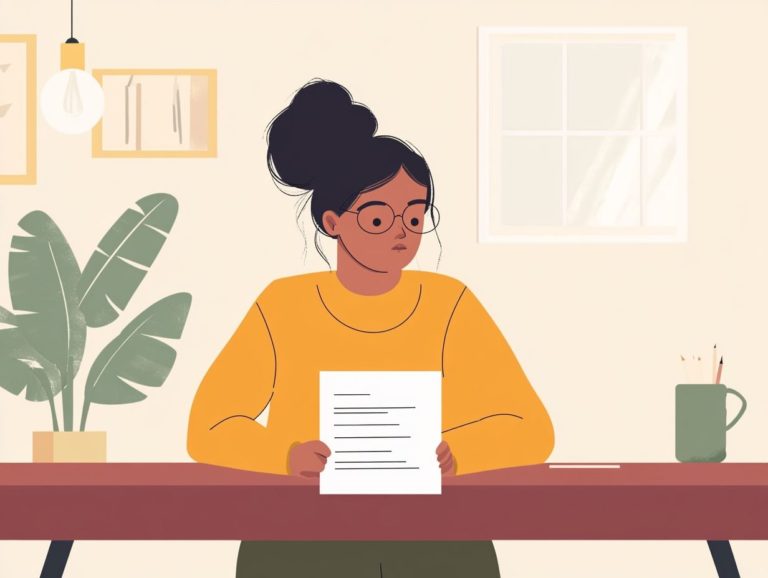How to Follow Up After a Negotiation
In the fast-paced realm of negotiations, your follow-up can be the crucial element that distinguishes between success and missed opportunities.
Whether you’ve just closed a deal or sparked a new dialogue, the way you approach your follow-up can profoundly impact the outcomes.
This article explores the importance of follow-up, the best timing for it, effective communication strategies, and ways to navigate potential roadblocks.
With practical tips and real-life examples, you ll discover how to elevate your negotiation skills and ensure your efforts yield fruitful results.
Contents
- Key Takeaways:
- The Importance of Follow-Up
- When to Follow-Up
- Methods of Follow-Up
- Addressing Potential Roadblocks
- Tips for Successful Follow-Up
- Examples of Follow-Up Scenarios
- Frequently Asked Questions
- 1. What is the importance of following up after a negotiation?
- 2. How soon should I follow up after a negotiation?
- 3. What should I include in my follow-up message?
- 4. Why should you follow up in writing?
- 5. Should I follow up even if the negotiation did not result in an agreement?
- 6. How can I follow up without being pushy or aggressive?
Key Takeaways:

Follow-up is crucial after negotiations to solidify agreements and maintain good relationships.
Timing and frequency of follow-up are important factors to consider for effective communication.
Best practices for successful follow-up include being persistent, professional, and open to addressing potential roadblocks.
The Importance of Follow-Up
In the realm of salary negotiation, follow-up is very important. It reflects your professionalism and reinforces your genuine interest in the job offer, ultimately boosting your chances of securing a favorable compensation package.
By employing effective follow-up strategies, you can bridge communication gaps with hiring managers. This also highlights your unique skills and professional identity. Meanwhile, you maintain a sharp awareness of industry standards that dictate appropriate compensation. This positions you as a savvy candidate in the negotiation process.
Why Follow-Up is Crucial in Negotiations
A follow-up in negotiations isn t just a courtesy; it s essential. It reaffirms your interest in the job offer and opens the door for clarifying expectations around the compensation package. This ensures both you and the employer stay engaged throughout the process.
When you follow up effectively, you significantly enhance the interaction. It allows you to address any lingering questions and showcase your enthusiasm for the role. By crafting a thoughtful negotiation email an email that you send to discuss terms and benefits after a job offer you reinforce your qualifications and express your willingness to discuss the details further.
This proactive engagement shows your professionalism and commitment, leaving a positive impression on the employer. Clear communication during this phase is crucial, as it helps prevent misunderstandings and aligns expectations for both parties.
Ultimately, this opens the door to a great deal for both you and the employer!
When to Follow-Up
Determining the right moment to follow up during the salary negotiation process is crucial. Timing can greatly affect the outcome of your negotiation email and how the hiring manager perceives your professionalism.
Timing and Frequency of Follow-Up
The timing and frequency of your follow-up emails can significantly influence the outcome of your salary negotiation. It s essential to find the right balance between being proactive and respecting the hiring manager s time.
Knowing when to reach out is critical at different stages of the hiring process. For instance, a well-timed follow-up after a second interview can showcase your enthusiasm and help reinforce your qualifications.
If benefits were discussed during negotiations but lacked clarity, sending a timely email can clarify the situation and transform ambiguity into a solid agreement.
By carefully considering the timing of these communications, you can subtly shape the dynamics of your negotiations, paving the way for not just a fair salary but also enhanced benefits that support your career growth.
Methods of Follow-Up

Selecting the appropriate follow-up methods is essential during salary negotiations. Effective professional communication not only enhances your position but also clarifies important details related to the job offer or the salary adjustment you ve requested.
Start your follow-up today!
Mastering Salary Negotiations
Effective communication strategies during salary negotiations can elevate your position. Using well-crafted negotiation emails that express your unique skills and professional image will resonate with hiring managers.
To enhance the impact of these strategies, structure your emails thoughtfully. Focus on the exceptional value you bring to the table. Begin with a clear subject line that sets the right tone, such as Discussion on Compensation Offer.
In the body, share specific accomplishments related to the role. Highlight successful projects or initiatives you’ve led to showcase your capabilities effectively.
Incorporate phrases that convey your enthusiasm for the role, along with a reasonable salary proposal based on industry standards, to foster a positive dialogue.
Show your commitment to professional growth and frame your requests collaboratively to enhance the negotiation process significantly.
Addressing Potential Roadblocks
You can navigate potential roadblocks in salary negotiations, like unresponsiveness or resistance from a hiring manager, with a strategic approach.
Craft your counteroffer response to be professional and impactful. Thoughtful preparation fosters an environment conducive to productive dialogue that advances your interests.
Dealing with Unresponsiveness or Resistance
Unresponsiveness or resistance during salary negotiations can be challenging. However, sending a well-timed follow-up email can re-engage the hiring manager and showcase your commitment to the process.
When crafting this email, strike a positive tone while conveying your eagerness to continue the dialogue. Begin by acknowledging previous conversations and emphasizing the importance of reaching a mutual understanding.
Formulate questions that invite feedback to demonstrate your genuine interest in the employer’s perspective. Highlight key points from past discussions to jog their memory and signal your investment in the outcome.
These strategies promote open communication. They also create a collaborative atmosphere, ultimately increasing the likelihood of a successful negotiation.
Tips for Successful Follow-Up
Incorporating best practices is essential for a successful follow-up during your salary negotiation process.
This approach reinforces your professional image and clarifies any unresolved issues regarding the job offer.
Best Practices for Effective Follow-Up

Employing best practices can significantly enhance your stance in salary negotiations. Craft a concise follow-up email that addresses key points and inquires about additional benefits. This is essential.
Your communication should include specific elements like a clear subject line, a respectful greeting, and a brief recap of the discussion. Express your appreciation for the opportunity and reiterate your interest in the role.
Utilizing templates can streamline this process. Start with a thank-you message, then transition into questions about benefits or further negotiations. Key components like deadlines for responses, new insights you ve gathered, and a request for a follow-up conversation can keep the dialogue open and productive.
By adopting these strategies, you ll navigate the complexities of professional negotiation with finesse while maintaining a positive rapport.
Examples of Follow-Up Scenarios
Exploring various follow-up scenarios offers invaluable insights for you as a job seeker.
Understanding how to navigate communications with hiring managers can significantly influence the outcome of your salary negotiation process.
Real-Life Examples and Outcomes
Real-life examples of salary negotiation follow-up emails can show how effective communication and strategic responses lead to positive outcomes, helping you grow in your career.
Consider the candidate who followed up with a carefully crafted email highlighting their research on industry standards. This proactive approach prompted the hiring manager to reconsider the initial salary offer.
Another example involves a job seeker who sent a follow-up message reiterating their unique value and relevant achievements. This approach led to a fantastic counteroffer and helped establish rapport with the employer.
This type of correspondence enhances your immediate negotiation effectiveness and cultivates relationships that may lead to career advancements.
Frequently Asked Questions
1. What is the importance of following up after a negotiation?
Following up after a negotiation is crucial. It shows your commitment to the agreement and builds trust with the other party. Mastering the follow-up also allows you to clarify misunderstandings and ensures both parties are aligned.
2. How soon should I follow up after a negotiation?

It is best to follow up within 24-48 hours. This shows you are prompt and eager to move forward. If a specific timeline was discussed, follow up within that timeframe.
3. What should I include in my follow-up message?
Your follow-up message should summarize key points discussed, any agreed action items, and express enthusiasm to move forward. Use this opportunity to thank the other party for the negotiation process.
4. Why should you follow up in writing?
While not mandatory, written follow-ups are highly recommended. They allow for a clear record of the negotiation and any agreements made, serving as a reference for both parties in case of future disputes.
5. Should I follow up even if the negotiation did not result in an agreement?
Yes, following up is still important, even without an agreement. It clarifies misunderstandings and allows for potential future negotiations. It also demonstrates professionalism and respect for the other party’s time and effort.
6. How can I follow up without being pushy or aggressive?
Be polite, respectful, and professional when following up. Avoid aggressive language and focus on expressing your interest in moving forward. Ask for their preferred communication method to ensure comfort with the follow-up process.
Now that you understand the importance of following up, take the first step today!






